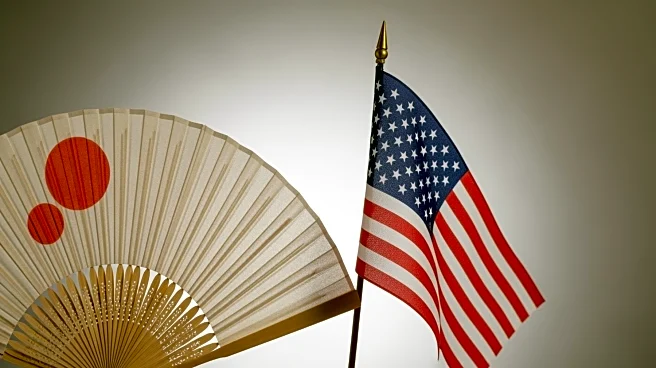What's Happening?
Japan's newly appointed Prime Minister, Sanae Takaichi, emphasized the importance of the Japan-U.S. alliance during her first phone call with U.S. President Donald Trump. Takaichi stated that enhancing
the alliance is the top priority for her administration's foreign and security policy. The conversation took place while Takaichi was attending a regional forum in Malaysia, and President Trump was en route to Malaysia on Air Force One. The leaders discussed the strategic partnership between Japan and the U.S., particularly in relation to China and the Indo-Pacific region. Takaichi also shared her positive impression of President Trump, describing him as cheerful and engaging.
Why It's Important?
The reaffirmation of the Japan-U.S. alliance is significant in the context of regional security dynamics, especially concerning China's growing influence in the Indo-Pacific region. Strengthening this alliance could lead to increased cooperation on defense and security matters, impacting geopolitical strategies in Asia. For the U.S., Japan remains a crucial partner in maintaining balance and stability in the region. This development may also influence trade and diplomatic relations, potentially affecting economic policies and international collaborations.
What's Next?
President Trump is scheduled to visit Japan, where he will hold a summit with Prime Minister Takaichi. This meeting is expected to further solidify the strategic partnership and may result in new agreements or initiatives aimed at enhancing bilateral cooperation. Observers will be watching for any announcements regarding defense collaborations or joint efforts in addressing regional challenges. The outcomes of this summit could have lasting implications for U.S.-Japan relations and broader regional security policies.
Beyond the Headlines
The emphasis on the Japan-U.S. alliance highlights the ongoing importance of international partnerships in addressing global challenges. It underscores the role of diplomacy in navigating complex geopolitical landscapes and the need for countries to adapt to shifting power dynamics. This development may also reflect Japan's strategic positioning in response to regional threats and its commitment to maintaining strong ties with key allies.











